You come home from work and your dog has gotten into the garbage. You’re tired from a long day – maybe your boss yelled at you about your low sales. You stomp over to the garbage, call your dog in a gruff voice and glare at him as he gets near enough for you to yell. You know your dog knows he’s done something wrong because it’s written all over his face – that guilty expression.
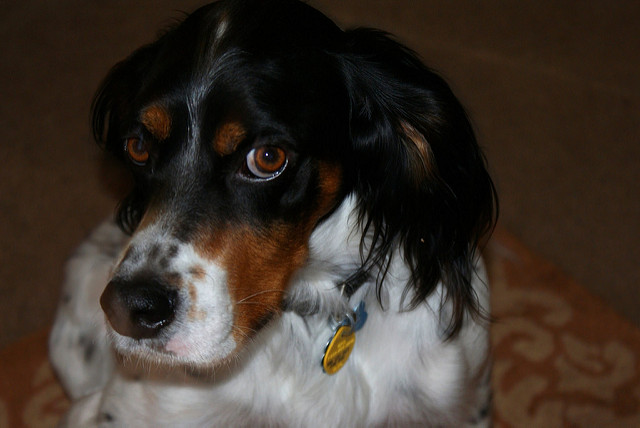
…Or is it?
Why We Call It “The Guilty Face”
Humans have a habit of anthropomorphizing animals (meaning we treat them as if they’re humans). We are constantly telling our friends what our pets are thinking or feeling in human terms.
For example, you may tell your friends that every time you dance around the house your dog looks at you like you are crazy. And many people say their cats look at them as if they are the lowly servant and the cat is the master. But neither of these are things that a pet would really know and understand – they are human terms. We use these to explain our pets’ expressions because it’s easier for us.
For example, most of us would look at the following picture and guess that the dog is thinking, “What the —?!! Crazy owner taking selfies!”
Why is the dog really making that face? There could be several possibilities, but it’s probably not about selfies — dogs don’t know what those are (he could be scared of the phone, however).
For the most part, it doesn’t do any harm. However, sometimes when you anthropomorphize, you are misreading real animal body language and that can cause problems.
When we come home and yell at the dog and he “looks guilty” because his facial expressions and body language are similar to those humans use to convey guilt, many of us say our dog knows that he did something bad.
The Truth About “The Guilty Face”
At a recent seminar I attended, Sue Sternberg, a leading canine behaviorist, called this behavior appeasement – a combination of cues brought on by a fear response from being scolded.
These images from Dr. Sophia Yin’s celebrated “Body Language Of Fear In Dogs” poster show us some basic attributes that we ascribe to guilt (lowered posture, ears dropped, whites of eyes showing). However, they are actually part of a dog’s fear language:
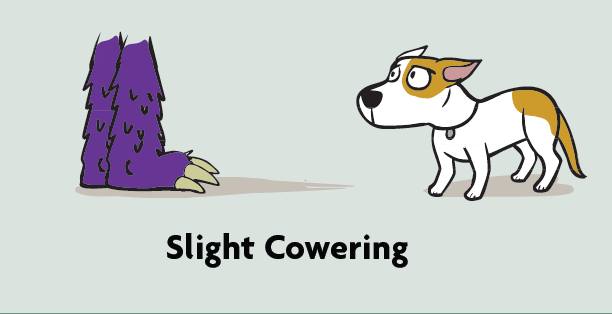
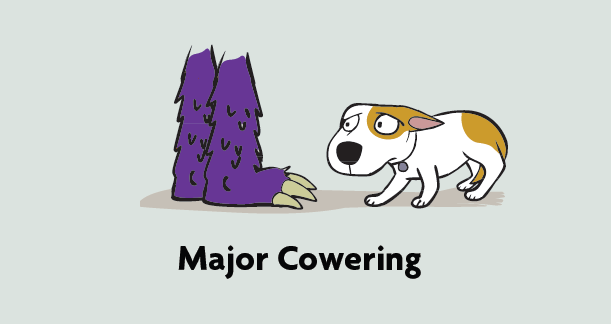
And many dogs show similar faces in situations that have nothing to do with a misdeed, like this dog who has to wear a cone:
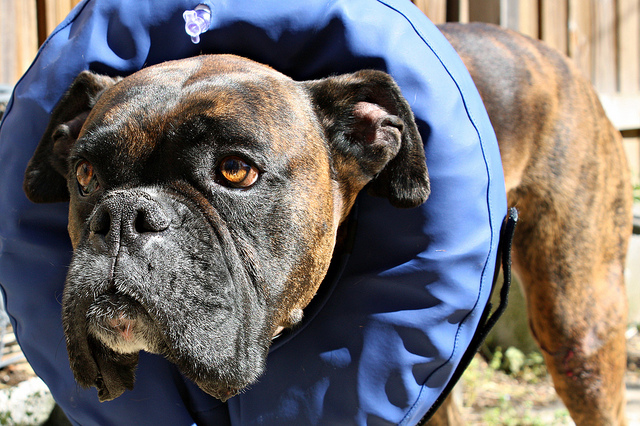
Study
A study published in Behavioural Processes, led by Ljerka Ostojic and approved by the University of Cambridge Animal Ethics Review committee, supports this as being a more likely definition of this particular response in dogs.
The study tested 96 dogs and their owners in their own environments (to remove the possibility of a new environment affecting the dogs’ reactions) in Croatia. They based their experiment off of the two cues that most owners use to back up the claim of “guilt”:
- Dogs show “the guilty face” before their owner even discovers they did something wrong.
- That dogs will act guilty even if they did not do the misdeed (for example, another dog in the house ate the food).
According to the researchers: “The aim of the current study was to test whether and which of these two cues might trigger the ‘guilty look’ in the absence of concurrent scolding.”
The owners did not know what the experimenters were testing. They were just asked to place a piece of food within their dog’s reach, tell the dog to leave it alone in any manner they choose, and then to move out of sight for 10 seconds. Upon returning, they were to observe their dog. They were then asked if they thought their dog ate the food or not.
There were four different trials with each dog/owner assigned randomly to one of them. The following are the four scenarios that took place while the owner was out of sight:
- Dog ate food, experimenter replaced it.
- Dog ate food, experimenter did not replace it.
- Dog did not eat food, experimenter removed the food and did not replace it.
- Dog did not eat food, experimenter removed the food and replaced it.
The results showed that owners could not tell whether their dog had actually eaten the food any more than chance. According to their study:
Critically, the dogs’ behaviour as perceived by the owners did not differ between the different conditions, suggesting that the dogs’ ‘guilty look’ was not influenced by their own action (i.e. whether the food had been eaten by the dog or removed by the experimenter) or the evidence of the misdeed (i.e. whether the food was present or absent upon the owners’ return).
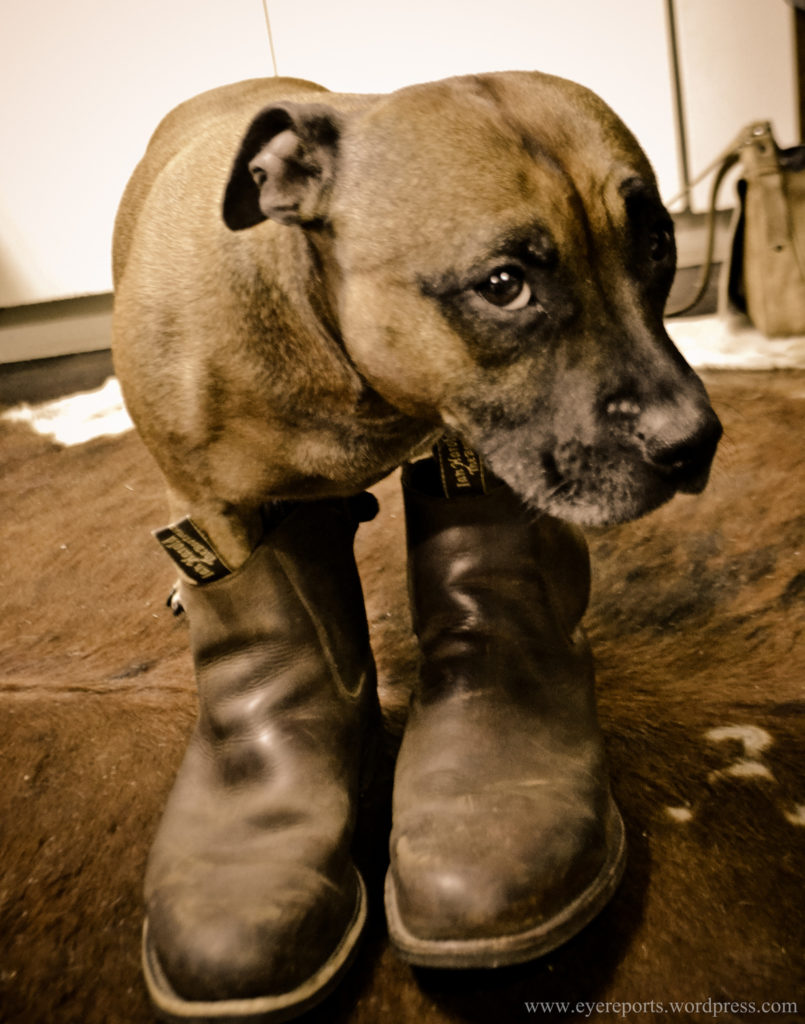
This means the dogs were displaying some type of “guilty look” in their owner’s eyes whether or not they had actually done something wrong.
Conclusion
In conclusion, the researchers reported: “Our findings indicate that–in the absence of scolding–neither of the two cues that were experimentally manipulated trigger the ‘guilty look’ in dogs.”
Most importantly, they say: “Thus, our findings could be taken to support the hypothesis that dogs’ ‘guilty look’ behaviours depend on their owners’ concurrent behaviour such as scolding or other negative reactions.”
Interestingly, dogs tended to have a more severe response when they were being scolded by the owner in the scenario where they did not eat the food but it had been removed by the experimenter. Further study is needed to explore the idea of a dog showing a “guilty” look before the owner knows of the misdeed, the researchers note. You can read the full experiment here.
It is important to note that the researchers are not saying dogs don’t feel guilt. Science has proven that dogs have the same capacities as us when it comes to emotions. What it is saying is that your dog may not feel guilty about things you think he should – like eating the garbage.

